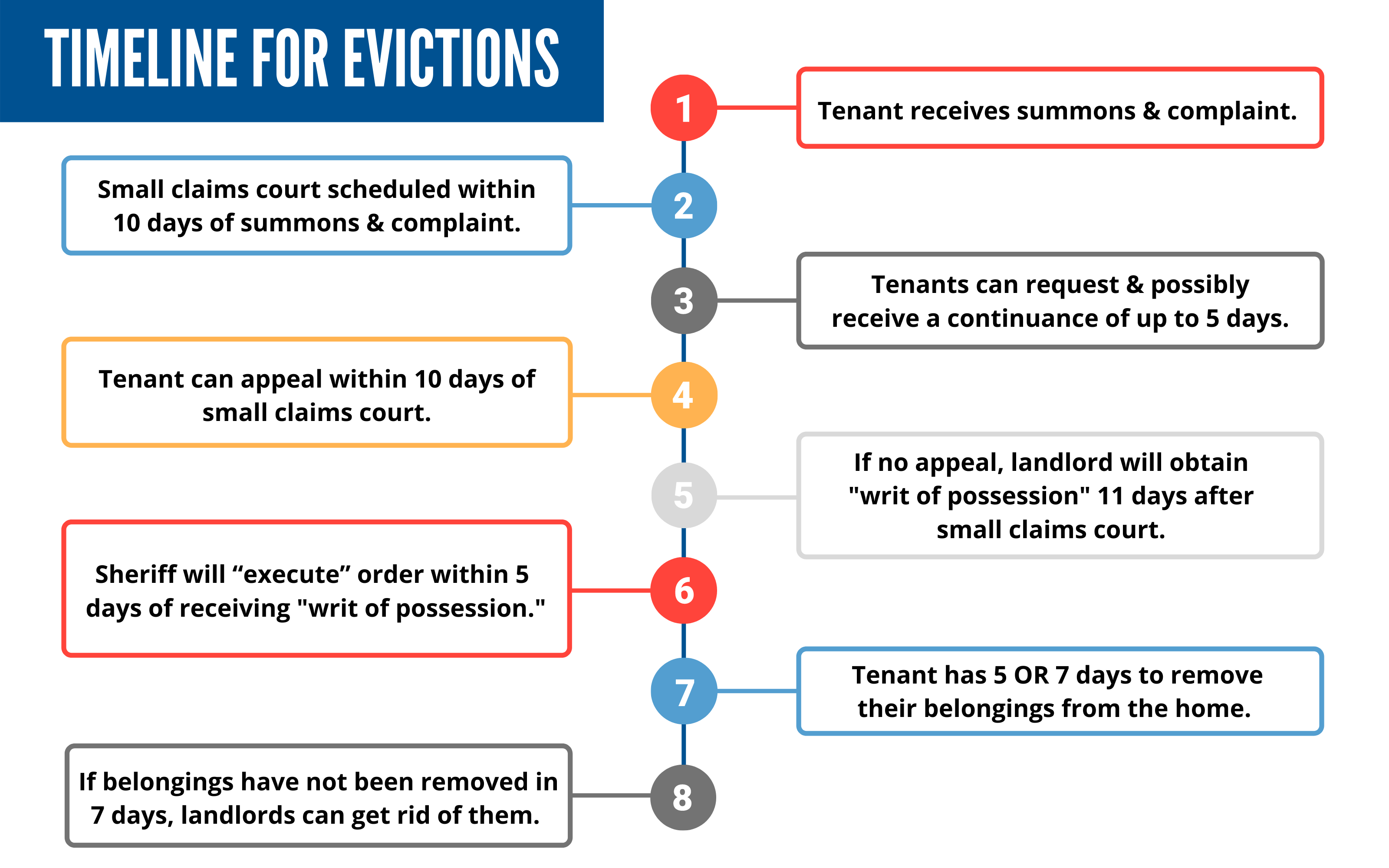NC Evictions
How does an eviction process work?
To evict tenants, landlords MUST take them to court. The landlord cannot use self-help measures such as changing the locks or stopping the utilities. Tenants can only be evicted by the Sheriff’s Office, and only after the Court has entered a judgment against them and the Clerk issues a “Writ of Possession.” Normally, the eviction process takes about 4 weeks. *This is only referring to the portion of the eviction in the NC court system.
**The tenants rent is not considered late until the 5th of the month. From that point, a 10 day notice to pay or quit must be given to the tenant. After that time (approximately around the 16th of the month) the landlord is allowed to file in a NC small claims court for a Summary Ejectment. The timeline for the remainder of the process is below.
***Delays from the courts may happen for several reason, the most common are larger than normal case loads and more recently people testing positive for Covid.

1. To begin the eviction process, the landlord must file a Magistrate’s Summons and a Complaint in Summary Ejectment with the Clerk of Court. In most cases, the landlord must give the tenant advance notice to end the lease or make a demand for past-due rent before starting the eviction process.
- The landlord must serve the tenant with the Summons and Complaint by paying the Sheriff’s Office or a process server to deliver it personally, or mail it by registered/certified mail or delivery service (FedEx, UPS, etc.). The landlord cannot personally deliver the Summons and Complaint.
2. Small claims court will be held within 10 days after the landlord files the summons and complaint. The date and time will be listed on the Summons and Complaint.
3. Tenants can receive a continuance (postponement of court date) of up to 5 days with the landlord’s agreement. This extra time allows tenants to find a way to pay past-due rent.
4. After a small claims court hearing takes place, the tenant can appeal for a new trial in District Court within 10 days. There are several ways to defend against an eviction in Court – these can include the landlord not giving proper notice, not properly serving the tenant, beginning the eviction process too soon, accepting some rent from the tenant, or failing to make necessary repairs. (Currently, many NC counties are months out to hear these cases).
- The tenant can stay in their home during the appeal if they file a “Bond to Stay Execution” and agree to pay future rent to the court each month until the new court date.
- There is a $150 filing fee to appeal. But, if the tenant receives public assistance (such as Food Stamps or Supplemental Security Income) they do not have to pay the appeal costs, as long as they fill out and file a “petition to Proceed Sue/Appeal as an Indigent” form. A tenant will need to request this form from the Clerk of Court
5. If the tenant does not appeal during this time or the appeal bond is unpaid, the landlord will receive “writ of possession” (order to remove tenant) 11 days after small claims court.
6. The Sheriff will “execute” the order within 5 days of receiving it but will give the tenant some advance notice. If the tenant has not moved by this time, the sheriff will order them to leave the property and their belongings will be locked inside.
7. After being removed/locked out of the residence, the tenant must set up a time with the landlord to remove their belongings from the home within 5-7 days.
8. If the tenant doesn’t remove their belongings within 7 days, the landlord will have the legal right to dispose of them.
What rights do tenants have?
Under North Carolina law, tenants have several protections, including:
- The landlord cannot remove a tenant without filing an eviction court case and receiving an eviction judgment from a judge or magistrate. The sheriff can only remove the tenant and their belongings after an eviction judgement has been ordered.
- The landlord does not have the right to take a tenant’s belongings before an eviction, even if a tenant owes rent.
- The landlord is NOT allowed to change locks, turn off the electricity or water, or do other things to force a tenant to move without going through the court process first.
THIS ARTICLE CAME DIRECTLY FROM NC211.org (Evictions)
